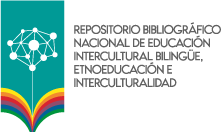Por favor, use este identificador para citar o enlazar este ítem:
http://repositoriointerculturalidad.ec/jspui/handle/123456789/4133| Título : | Análisis de caso el aprendizaje de la lengua kichwa en el cuarto año de educación básica en la Unidad Educativa Fiscal Intercultural Bilingüe “Monseñor Leonidas Proaño” |
| Autor : | Hurtado Jorque, Amable Alcocer Naula, Nelson Aníbal |
| Palabras clave : | EDUCACIÓN INTERCULTURAL BILINGÜE;ENSEÑANZA -- APRENDIZAJE;LENGUAJE KICHWA;MÉTODOS DE ENSEÑANZA;REPOSITORIOEIB;EDUCACIÓN BÁSICA;ENSEÑANZA DE UNA SEGUNDA LENGUA;RIOBAMBA |
| Fecha de publicación : | mar-2019 |
| Editorial : | Universidad Politécnica Salesiana – UPS |
| Resumen : | The purpose of the present case study was to identify and evaluate the revaluation of the Kichwa language in children, teachers, parents, authorities and other entities that make up the educational community, for which the theoretical, pedagogical and On which the work was based on the ideas of different authors who analyze the importance of learning the Kichwa language. The methodology that was used to carry out the present research work had a qualitative and quantitative approach, because the daily life of the girls, boys and teachers of the school was evidenced and, through the technique of the survey, the necessary knowledge was produced for Evidence the problem and analyze and interpret the quantifiable data. For the place the investigation was of field, when going to the educational institution to observe directly the behavior of the variables without manipulation some; and bibliographical as the present research has theoretical foundations that support the learning of the Kichwa language. The techniques that were used were the survey with its respective instrument that is the questionnaire and the observation sheet with a checklist. The data collected were tabulated and presented in statistical tables and graphs and analyzed to determine the level of use of the Kichwa language in the children of the fourth year of General Basic Education of this Intercultural Bilingual institution, data that allowed the elaboration of conclusions And recommendations of the investigative work. |
| Descripción : | El presente estudio de caso tuvo como propósito identificar y conocer la revalorización de la lengua kichwa en las niñas y niños, docentes, padres de familia, autoridades y más entes que conforman la comunidad educativa, para lo cual se contrastó las fundamentaciones teóricas, pedagógicas y didácticas, en las que se basó el trabajo con las ideas de los diferentes autores que analizan la importancia del aprendizaje de la lengua materna kichwa. La metodología que se utilizó para llevar a cabo el presente trabajo investigativo tuvo un enfoque cualitativo y cuantitativo, porque se evidenció el diario vivir de las niñas, niños y docentes de la escuela, y mediante la técnica de la encuesta se produjo los conocimientos necesarios para evidenciar el problema y analizar e interpretar los datos cuantificables. Por el lugar la investigación fue de campo, al acudir a la institución educativa para observar directamente el comportamiento de las variables sin manipulación alguna; y bibliográfica ya que el presente trabajo investigativo posee fundamentaciones teóricas que sustentan el aprendizaje de la lengua kichwa. Las técnicas que se utilizaron fueron la encuesta con su respectivo instrumento que es el cuestionario y la ficha de observación con una lista de cotejo. Los datos recopilados se tabularon y presentan en cuadros estadísticos y se analizaron para determinar el nivel de uso de la lengua kichwa en las niñas y niños de cuarto año de Educación General Básica de esta institución Intercultural Bilingüe, datos que permitieron la elaboración de conclusiones y recomendaciones del trabajo investigativo. |
| URI : | http://8.242.217.84:8080/xmlui/handle/123456789/4133 |
| metadata.dc.identifier.other: | http://dspace.ups.edu.ec/handle/123456789/17042 |
| Aparece en las colecciones: | 1.30 Educación |
Ficheros en este ítem:
| Fichero | Tamaño | Formato | |
|---|---|---|---|
| UPS-QT13831.pdf | 1,18 MB | Adobe PDF | Visualizar/Abrir |
Este ítem está sujeto a una licencia Creative Commons Licencia Creative Commons

